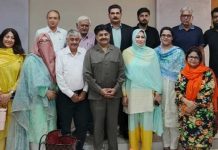NICK, TAF launch ‘Impact Collective’ initiative
KARACHI: The National Incubation Center Karachi, in collaboration with The Asia Foundation, launched the ‘Impact Collective’. The initiative is a consortium of organizations committed to initiating research and technology-driven dialogue to address the Environmental, Social, and Governance (ESG) issues in Pakistan, says a Press release.
In the upcoming months, The Asia Foundation will award research grants to three members of the Impact Collective to conduct research on the environmental crisis that the country is currently facing. This research will guide the legislators, policymakers, public administrators, civil society activists, and ESG, sustainability, and CSR departments of corporate entities to develop policies and solutions to address the impending climate crisis that Pakistan is currently facing.
Atif Rais Khan, CEO, LMKT, while appreciating the strategic partnership between LMKT and The Asia Foundation, said that, “Climate change and its resulting calamities are a reality for the world in general and Pakistan in particular. It is the duty of every citizen, corporation, and innovation-driven enterprise to step up and help humanity get through these difficult times. Impact Collective is an effort to help build better processes and solutions to manage and mitigate the adverse effects of climate change in Pakistan as well as other developing nations.”
In his opening statement, Omar Abedin, Director of NIC Karachi, said that “Humanity is capable of achieving great feats. In the last few centuries, we have achieved feats that were considered impossible to achieve, and we can reverse and restore climate change too. We have the technology, the data, and the tools. What we need is the will and the mindset. I am hopeful that the impact pool will embed that will among the policymakers and citizens of Pakistan. ”
While explaining the purpose of establishing the Impact Collective, Haris Qayyum Khan, Director Strategy & Operations, Asia Foundation, said that, “Even though Pakistan contributes less than 1% of the global greenhouse gases that warm our planet, its geography makes it extremely vulnerable to climate change. The country cannot change its geographical location, but it can develop policies, systems, and mindsets to mitigate the adverse effects of climate change. We can accomplish this by conducting research and developing innovative solutions based on the findings of indigenous studies.”
As a testament to LMKT’s commitment to the livelihood and economic rehabilitation and restoration of the flood affectees across Pakistan, Project Director NICK offered a donation of PKR 1 Million on behalf of LMKT to The Citizen’s Foundation at the event’s conclusion.







